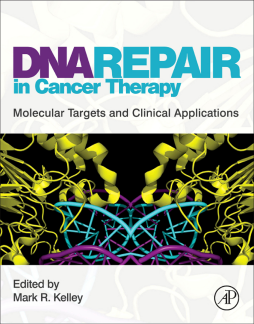
Additional Information
Book Details
Abstract
Cancer therapeutics include an ever-increasing array of tools at the disposal of clinicians in their treatment of this disease. However, cancer is a tough opponent in this battle, and current treatments, which typically include radiotherapy, chemotherapy and surgery, are not often enough to rid the patient of his or her cancer. Cancer cells can become resistant to the treatments directed at them, and overcoming this drug resistance is an important research focus. Additionally, increasing discussion and research is centering on targeted and individualized therapy. While a number of approaches have undergone intensive and close scrutiny as potential approaches to treat and kill cancer (signaling pathways, multidrug resistance, cell cycle checkpoints, anti-angiogenesis, etc.), other approaches have focused on blocking the ability of a cancer cell to recognize and repair the damaged DNA that primarily results from the front-line cancer treatments; chemotherapy and radiation.
This comprehensive and timely reference focuses on the translational and clinical use of DNA repair as a target area for the development of diagnostic biomarkers and the enhancement of cancer treatment.
- Saves academic, medical, and pharmaceutical researchers time in quickly accessing the very latest details on DNA repair and cancer therapy, as opposed to searching through thousands of journal articles
- Provides a common language for cancer researchers, oncologists, and radiation oncologists to discuss their understanding of new molecular pathways, clinical targets, and anti-cancer drug development
- Provides content for researchers and research clinicians to understand the importance of the breakthroughs that are contributing to advances in disease-specific research
"This volume, orchestrated by Mark R. Kelley from Indiana University, offers 14 chapters by acknowledged experts that address the particular relationship between DNA repair and cancer. The content of the book is considerably broadened and enhanced by addressing topics such as the possible use of alterations in DNA as predictive biomarkers and the role of DNA damage and its repair in neurotoxicity associated with cancer therapy. Kelley appropriately concludes the volume with a thoughtful exploration of future directions in the use of inhibitors of the DNA damage response." -- Errol C. Friedberg, University of Texas Southwestern Medical Center at Dallas, Dallas, TX, USA
"DNA Repair in Cancer Therapy is an excellent primer for the cancer researcher interested in learning about the role of DNA repair in malignancy. Its chapters are accessible to the generalist yet offer a depth of discussion which is both comprehensive and detailed. This book should serve as an excellent entry to a complex field and a useful resource to all those seeking an in-depth review of this rapidly evolving area of drug discovery and development." --Homer L. Pearce, Ph.D., Eli Lilly and Co. (retired)
"DNA Repair in Cancer Therapy provides the reader with a primer-level introduction to the six major DNA repair pathways, their interrelationships, their connectivity and regulation by other cellular operational systems, as well as their impact in shaping the development of effective cancer therapies. Chapters are well-written, detailed and up-to-date. The challenges that face new anticancer drug development based on DNA repair targets are clearly laid out and succinctly discussed with an emphasis on particular directions that are likely to result in success. The enormous complexities that have to be considered for this undertaking are placed into an understandable context and dealt with in a logical and clear fashion. The landscape of opportunity in this area is vast and challenging but has the potential to produce results that will make a real difference in patient responses to radio- and chemotherapy. This book should be of great interest and value to a variety of readers, including basic, translational and clinical scientists as well as individuals in the pharmaceutical and technology development industries." -- Paul W. Doetsch, Ph.D., Professor of Biochemistry, Radiation Oncology, and Hematology & Medical Oncology, Distinguished Chair of Cancer Research, Winship Cancer Institute, Emory University School of Medicine, Atlanta, GA, USA
